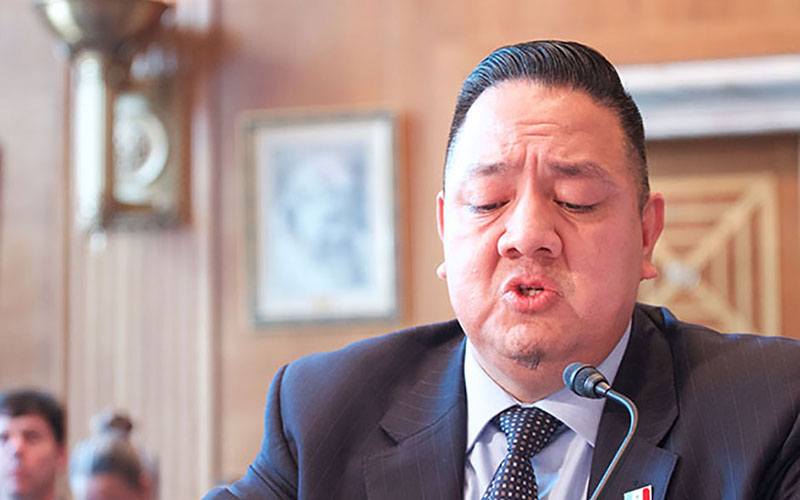
Pascua Yaqui Attorney General Alfred Urbina told a Senate committee that the current relationship between state, federal and tribal law enforcement agencies is “unworkable, unreliable.” (Photo by Emily Zentner/Cronkite News)
WASHINGTON – A Pascua Yaqui official said Wednesday that changes to federal law allowing tribes to prosecute nonmembers for domestic violence represented “a new dawn” for Native Americans, but there are gaps in the law that need to be addressed.
Pascua Yaqui Attorney General Alfred Urbina told the Senate Indian Affairs Committee that his tribe has been able to prosecute 22 non-Indians for domestic violence since winning that authority in 2014, and has convicted eight.
But Urbina, testifying in support of three bills on tribal law enforcement, said the currently law is so narrowly drawn that tribal authorities cannot proceed with prosecuting suspects on other charges that are not directly related to the domestic violence.
He said in his prepared testimony that those could include cases where “the offender was in possession of illegal drugs, assaulted a police or detention officer, destroyed property or committed any other crime” while being charged under the Violence Against Women Act.
“Lawmakers should have thought about children at the scene in domestic violence arrests,” Urbina said after the hearing. “There are children that we’ve had to pull out (of a home), or that have been assaulted or exposed to violence.”
Because tribal law enforcement does not have jurisdiction to charge offenders for violence against children, Urbina said tribal police instead have to remove these children from their homes. He said in his written testimony that “domestic violence jurisdiction must be expanded to include children.”
That was echoed by Dana Buckles, a councilman from the Assiniboine and Sioux Tribes of the Fort Peck Reservation in northeast Montana. Buckles said in his prepared testimony that over half of those seeking help from the tribe’s Family Violence Resource Center were children.
“This amounts to approximately 1,000 children, who were in need of family crisis services as victims or witnesses of domestic violence in their homes,” Buckles said.
The Tribal Youth and Community Protection Act, sponsored by Sens. Jon Tester, D-Montana, and Al Franken, D-Minnesota, would expand tribal jurisdiction to include drug offenses, domestic violence against children and other charges.
A Justice Department official agreed that there are “three significant gaps” in the law that must be closed, but worried about making changes that are too sweeping.
Tracy Toulou, the director of the Justice Department’s Office of Tribal Justice, said there are questions about whether “domestic violence” includes the threat of force, whether children are included as well as spouses and partners, and whether it includes violence against police or law enforcement officials by defendants resisting arrest, for example.
But Toulou said those gaps can be closed without adding broad new categories of crimes to the law’s jurisdiction.
It may make sense one day to include “additional non-Indian perpetrators, perhaps starting with those offenders who abuse children … and then considering other offenders such as perpetrators of sexual assault, stalking, and sex trafficking, and criminals who bring illegal drugs into tribal communities.”
But the department thinks reforms for now “should focus instead on clarifying and expanding tribal prosecutors’ tools for bringing to justice the defendants who are already within the tribe’s jurisdiction,” he said.
All the witnesses agreed that giving local authorities the power to pursue prosecutions is the best course, however.
“It is clear that the starting place to reverse historical jurisdictional problems and injustice in Indian Country is by empowering tribal justice systems,” Urbina said.